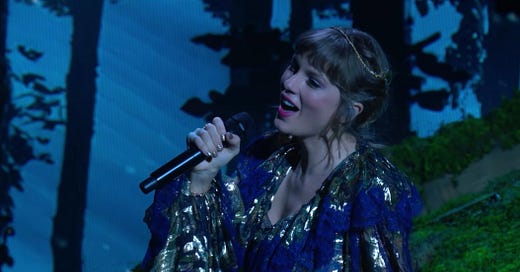Defector's Kelsey McKinney on Her New Novel and the Endless Wonders of Taylor Swift
All that and more in today's 'What Now' newsletter.
Welcome back to this preview of What Now, Discourse Blog’s premium newsletter experience. This week, I spoke with Defector co-founder/owner/features writer Kelsey McKinney, who also happens to be a close friend. Also! Her debut novel, God Spare The Girls, is out June 22 from William Morrow. I called Kelsey up to talk about how you go about writing your first book, what it was like to start Defector, and of course, Taylor Swift.
This interview has been edited and condensed for clarity.
What does it look like when someone writes a book for the first time? Because I think in the larger imagination, it's like Jo March in Little Women.
I don't think that that is a wrong perception. The way I started was on yellow legal notepads scribbling in the summer, because I was really miserable. And I was like, 'I'll just write like a few pages every day, maybe this will help.' And then I got to the end of that time period and was feeling better. I realized, 'Oh, actually, some of this isn't complete shit, so maybe I should stick with this.’ And I tried to fix it up and make it a little more interesting. Then I spent a few months working in a Google Doc and printing things out and that part was easier than what came later. After that, I had a few close friends read it. You read it at that point, when it was a mess, but still legible. And I got that feedback, which was very helpful. So I made it much better. And then I found an agent. And after that, I did the whole thing again, but like on steroids.
So it sounds to me like you're kind of just kind of miserable for a very long time. And then one day, you get a package in the mail: it's your book.
It's hard because I think a lot of people—a lot of writers in particular—talk about the writing itself as very miserable. And I have never felt that way. I like to write. And I find it very cathartic. And sometimes the things that I write are bad, but that is not emotionally upsetting to me, I just throw them away. It's not the writing itself that is horrible as much as it is the process of making something that other people can read that is horrible, right? So both the publishing and the refining of an idea. When you're just writing on your own, you have something that you like and that makes sense to you, and you have one other person read it and they're like, 'None of this dialogue makes any sense to me, I have no idea what's going on.' So you have to redo it. I feel like that kind of editing is a transition from thinking about your own work as for you—that you want—into thinking about your work as something that other people consume. And I find that process very challenging, mainly because you kind of have to let go of what you want the book to be in order to let the book be what other people need it to be.
Keep reading with a 7-day free trial
Subscribe to Discourse Blog to keep reading this post and get 7 days of free access to the full post archives.





